
December 2022 – Illinois Policy Update
December 7, 2022
BPA tracks the latest policy updates and legislative issues in many states across the nation. See the latest policy information for Illinois as of December 2022.
Disclaimer: Inclusion of any bills/regulations in this state policy update does not equate to BPA’s endorsement.
The Illinois Commerce Commission (ICC) is holding public workshops through the end of the year on the development of the Equitable Energy Upgrade Program. This program was established by the Climate and Equitable Jobs Act (CEJA) passed in 2021 to provide no-upfront-cost financing options for residential utility customers to receive clean energy and energy efficiency upgrades (more details below).
Governor Pritzker and the Illinois Department of Commerce and Economic Opportunity (DCEO) announced $300 million in available funding through the Low-Income Home Energy Assistance Program (LIHEAP), a federally funded program that provides financial assistance to reduce home energy costs including through weatherization, HVAC repairs and utility bill assistance. Beginning September 1, 2022, homeowners can apply for LIHEAP assistance via the Help Illinois Families program.
On July 1, the FY2023 Budget took effect in Illinois, which includes $9 million in federal funding from the Infrastructure Investment and Jobs Act (passed by U.S. Congress in November 2021) for the Illinois Environmental Protection Agency to promote energy efficiency including “to provide incentives for homes and buildings to install energy conservation measures.” The budget also includes $2 million for the creation of the Climate Jobs Training Institute under the Illinois Board of Higher Education (IBHE) to produce research and recommendations to maximize employment opportunities in the clean energy industries and particularly in underserved communities. Funding for the Climate Jobs Training Institute comes after the passing of CEJA established Climate Works Hubs to create a “network of hubs throughout the State that will recruit and provide apprenticeship skills training”” in the construction, building and clean energy trades.
Regulatory Monitor:
- As mandated by CEJA, the ICC is holding monthly workshops to finalize guidelines on the Equitable Energy Upgrade Program (EEUP), which will require utilities to finance residential energy projects including energy efficiency upgrades, energy storage systems, and demand response equipment through on-bill monthly payment without upfront costs for customers. CEJA specifies that utilities may work with third-party lenders or apply for public funding to support the costs of investments in energy projects and customers may also pay down the costs for projects in the EEUP with a direct payment to the installing contractor. On October 25, the ICC held its fourth workshop in a series launched in June to provide a forum for public input regarding the development of EEUP. More information to attend the public workshops is available through the ICC, which has not yet announced next steps on implementation.
- The ICC has granted approval of 2022-2025 energy efficiency plans from Illinois utilities including Ameren, MidAmerican, and Commonwealth Edison that will guide compliance with the increased energy efficiency resource standard set by CEJA of 21.5% cumulative energy savings by 2030. The 2022-2025 plans were submitted to the ICC in March and set an “Electric Demand Response Goal” for each of the major electric utilities to reduce peak demand 0.1% over the prior year. To meet these goals, the plans include building energy efficiency programs to help customers replace or retrofit existing home energy equipment (such as HVAC systems and thermostats), receive weatherization services, and conduct comprehensive building retrofits. Finally, the plans note that utilities will continue to investigate additional integration methods for advanced metering infrastructure (AMI).
- After being approved by the Illinois Commerce Commission in October of 2021, expanded four-year electricity and gas efficiency spending plans went into effect for the state’s utilities on January 1, 2022. The plans include $50 million in funding across the four state utilities to administer low- and middle-income multifamily energy savings programs, providing deep building retrofits, weatherization services, and HVAC upgrades. The new plans also allocate additional money to address mold remediation and provide indoor air quality improvements in low-income homes. These bolstered efficiency programs are in line with the state’s new increased electric savings goal to achieve 21.5% reduction in energy use by 2030 as required by CEJA (mentioned above).
Legislative Monitor:
2022 Regular Session Dates: January 4 until December 31, 2022. **Note: Session remains ongoing throughout the year.
Bills considered but not passed in 2022:
- HB 4390 CEJA Technical Change would limit the amount utility customers can be charged for the Energy Transition Assistance Charge, which was created under CEJA to raise funding for clean energy and energy efficiency programs in Illinois. Under the legislation, the charge cannot exceed 1.3% of the amount paid per kilowatt hour by utility customers.
